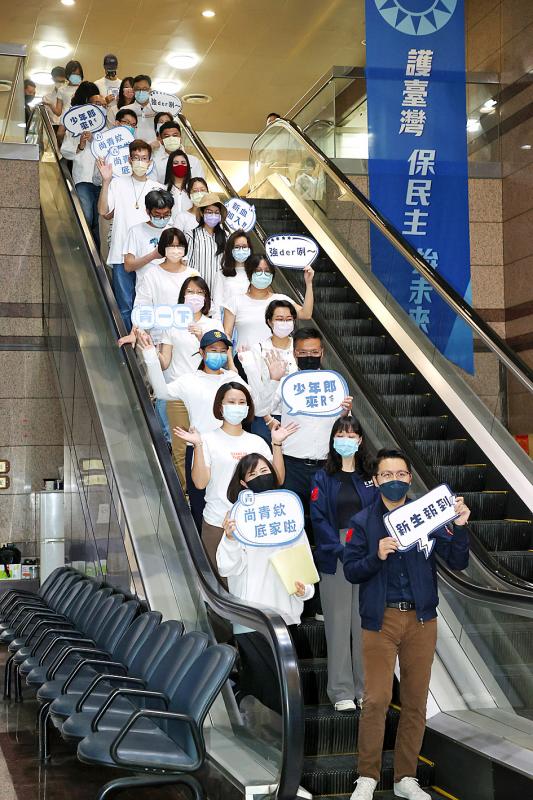Chinese Nationalist Party (KMT) Chairman Eric Chu (朱立倫) yesterday rebutted rumors that former KMT member Hsu Hsin-ying (徐欣瑩) was planning to run in November’s local elections, after accepting Hsu’s application to rejoin the KMT.
Hsu, who left the KMT seven years ago to found the Republican Party, yesterday led 100 young people who joined her in filing applications at KMT headquarters.
Chu accepted the applications and gave Hsu her party membership certificate.

Photo: CNA
Asked by a reporter if she was thinking about running in November’s elections, Hsu answered that she had not even thought about it.
Chu said that Hsu’s return to the KMT was the “right course of action for now.”
Commenting on KMT Taipei City Councilor Hsu Chiao-hsin’s (徐巧芯) accusations that the party was using young people as a front, Chu said that young party members would not be “sacrificed” to the party’s interests, but would instead become its “mainstream.”
Asked about media reports citing the party’s low 16 percent support rating among young people, Chu said that polls were only for reference, and that the party is taking action to remedy this.
“The KMT has polls, too, and we expect to show you the latest results on Friday,” he said. “We will strive, one step at a time, to win the recognition of young people.”
While the Democratic Progressive Party (DPP) has money, power and government positions, the KMT only has ambition, a love for Taiwan and the determination to work hard for the Republic of China, he said.
“If a young person wants to be a high-ranking official and make a lot of money, they should join the DPP. They will have no power or official position in the KMT,” he said. “Anyone who wants to join the KMT should be ambitious and determined — and Hsu Hsin-ying represents that spirit.”
Hsu Hsin-ying said she hoped Taiwanese would support the KMT so that Taiwan would “not be hurt by the dominance of one party,” or that there would be “no accidental military conflict” with China, which Taiwan’s military “would not be able to handle.”

Prosecutors in New Taipei City yesterday indicted 31 individuals affiliated with the Chinese Nationalist Party (KMT) for allegedly forging thousands of signatures in recall campaigns targeting three Democratic Progressive Party (DPP) lawmakers. The indictments stem from investigations launched earlier this year after DPP lawmakers Su Chiao-hui (蘇巧慧) and Lee Kuen-cheng (李坤城) filed criminal complaints accusing campaign organizers of submitting false signatures in recall petitions against them. According to the New Taipei District Prosecutors Office, a total of 2,566 forged recall proposal forms in the initial proposer petition were found during the probe. Among those

ECHOVIRUS 11: The rate of enterovirus infections in northern Taiwan increased last week, with a four-year-old girl developing acute flaccid paralysis, the CDC said Two imported cases of chikungunya fever were reported last week, raising the total this year to 13 cases — the most for the same period in 18 years, the Centers for Disease Control (CDC) said yesterday. The two cases were a Taiwanese and a foreign national who both arrived from Indonesia, CDC Epidemic Intelligence Center Deputy Director Lee Chia-lin (李佳琳) said. The 13 cases reported this year are the most for the same period since chikungunya was added to the list of notifiable communicable diseases in October 2007, she said, adding that all the cases this year were imported, including 11 from

China might accelerate its strategic actions toward Taiwan, the South China Sea and across the first island chain, after the US officially entered a military conflict with Iran, as Beijing would perceive Washington as incapable of fighting a two-front war, a military expert said yesterday. The US’ ongoing conflict with Iran is not merely an act of retaliation or a “delaying tactic,” but a strategic military campaign aimed at dismantling Tehran’s nuclear capabilities and reshaping the regional order in the Middle East, said National Defense University distinguished adjunct lecturer Holmes Liao (廖宏祥), former McDonnell Douglas Aerospace representative in Taiwan. If

The Mainland Affairs Council (MAC) today condemned the Chinese Communist Party (CCP) after the Czech officials confirmed that Chinese agents had surveilled Vice President Hsiao Bi-khim (蕭美琴) during her visit to Prague in March last year. Czech Military Intelligence director Petr Bartovsky yesterday said that Chinese operatives had attempted to create the conditions to carry out a demonstrative incident involving Hsiao, going as far as to plan a collision with her car. Hsiao was vice president-elect at the time. The MAC said that it has requested an explanation and demanded a public apology from Beijing. The CCP has repeatedly ignored the desires